

workshop/symposium speakers
Workshop: Online Simulations and Remote Access Visualization Tools for Science & Technology CurriculaKeynote Title: Online Simulations and Remote Access Visualization Tools for Science & Technology Curricula |
|
|
Dr. Ahmed S. Khan
Fulbright Specialist Scholar |
|
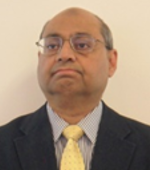
Dr. Ahmed S. Khan Fulbright Specialist Scholar, World Learning Inc. U.S. Dept. of State’s Bureau of Educational & Cultural Affairs (ECA) |
|
|
|
|
|
Speaker Biography:
Dr. Khan has more than forty years of progressively responsible experience in instruction (online and onsite), applied research, curriculum development, program and institutional accreditation, management, and supervision of academic programs at DeVry University. Dr. Khan held many academic positions that include Senior Processor, Chair, and Dean of the College of Engineering & Information, DeVry University, Addison, Illinois, USA. Dr. Khan also served as the National Curriculum Manager at the national headquarters of DeVry University, where he supervised and managed curriculum development and implementation of BSEEt & MSEE programs at 25 DeVry campuses located in the United States and Canada. Dr. Khan received an M.Sc (Applied Physics) from University of Karachi, an MSEE from Michigan Technological University, an MBA from Keller Graduate School of Management, and his Ph.D. from Colorado State University. His research interests are in the areas of Nanotechnology, New Teaching & Learning Techniques, and Social and Ethical Implications of Technology. He is the author of many educational papers and presentations. He has authored/coauthored many technical books, including the Telecommunications Factbook, and Science, Technology & Society (STS) series of books that include Technology and Society: Issues for the 21st Century & Beyond, and Nanotechnology: Ethical and Social Implications, to stimulate, inspire, and provoke awareness of technology’s impact on society. Dr. Khan is a senior member of the Institute of Electrical and Electronics Engineering (IEEE), and a member of American Society of Engineering Education (ASEE). Dr. Khan also serves as program evaluator for the accreditation agency ABET. | |
Workshop: Online Simulations and Remote Access Visualization Tools for Science & Technology Curricula |
|
|
Dr. Salahuddin Qazi
Emeritus Professor School of Information Systems and Engineering Technology State University of New York Institute of Technology (SUNYIT), Utica, New York |
|
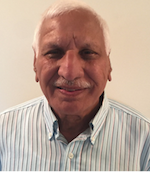
Dr. Salahuddin Qazi |
|
|
|
|
|
Speaker Biography:
Salahuddin Qazi holds a Ph.D., degree in electrical engineering from the University of Technology, Loughborough, England, UK. He is currently an Emeritus Professor and past chair of School of Information Systems and Engineering Technology at the State University of New York Institute of Technology, Utica, New York. Prior to becoming Professor Emeritus, he spent a year completing a NSF (National Science Foundation) funded project on developing instructional material for "Visualization and Manipulation of Nanoscale Components using Atomic Force Microscopy" as a Principal Investigator. He is currently involved in consulting activities for emerging technologies and higher education and have recently completed a book on "Standalone Photovoltaic Systems for Disaster Relief and Remote Areas. He is also a member of an industrial advisory board for the Engineering Technology department for the University of Maryland Eastern Shores, Princess Anne, MD. Dr. Qazi has participated as an invited speaker and presenter in several international conferences and workshops. He was a CO-PI for a US-Pakistan conference on “High Capacity Optical Networking and Enabling Technology,” which was jointly supported by the National Science Foundation (NSF) of USA and the Higher Education Commission (HEC) of Pakistan. He is recipient of several awards including the William Goddel award for research creativity at SUNYIT and engineering professionalism by Mohawk Valley Engineering Executive Committee, and forging closer relations with the IEEE Mohawk Valley section. Dr. Qazi is a life member of IEEE. | |
Workshop: Online Simulations and Remote Access Visualization Tools for Science & Technology Curricula |
|
|
Dr. Atilla Ozgur Cakmak
Grand Valley State University, Michigan |
|
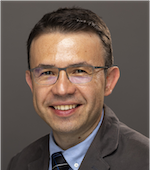
Dr. Atilla Ozgur Cakmak |
|
|
|
|
|
Speaker Biography:
Atilla Ozgur Cakmak graduated from Sabanci University, Istanbul, Turkey with a BSc degree in Microelectronics Engineering in 2003. He obtained his MSc degree in Computer Science and Electronics Engineering also from Sabanci University in 2005. Dr. Cakmak earned his PhD degree from Bilkent University, Ankara, Turkey in 2012 from the Department of Electrical and Electronics Engineering. After a brief postdoctoral experience at Bilkent University within NANOTAM (Nanotechnology Research Center), Dr. Cakmak joined Penn State in 2013 as a postdoctoral researcher to work on thin film solar cells. Dr. Cakmak got promoted to Assistant Teaching Professor at Penn State within the Department of Engineering Science and Mechanics in 2018. He taught graduate and undergraduate courses in the field of nanotechnology and nanofabrication. Dr. Cakmak is currently an Assistant Professor of Electrical Engineering in School of Engineering in Grand Valley State University, Michigan. Dr. Cakmak co-authored more than 20 papers in the leading journals in his expertise field of nanophotonics and microwave engineering. Dr. Cakmak also contributed with educational publications to the field of nanotechnology and nanoscience. He is an editor in Journal of Advanced Technological Education and a guest editor of MDPI. He has also been contributing as a reviewer to various optics/photonics, applied physics and nanotechnology themed journals. | |
Symposium: Smart Sensing for e-Healthcare Applications using IoT, AI and ML TechnologiesTitle: Challenges, Risks, and Benefits of Health Data Sharing |
|
|
M. Aslam Prof., Fmr. Rector Shifa Medical Univ, Islamabad, Pakistan |
|
|
Abstract:
|
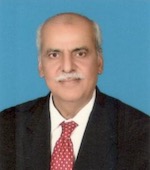
Prof. M. Aslam |
|
|
|
|
Speaker Biography:
Maj Gen. Ret’d., Prof. Dr. Muhammad Aslam, MBBS [Pb], M. Phil. [Pb], Ph.D. [London], FPAMS, FCPS [Pak], FCPS [Bangladesh], has a distinguished and long career in the field of medicine from a Physician to Professor and high-level education leadership. He has four- decades (40+ years) of active teaching and research experience in physiology at under and postgraduate levels at Army Medical College, National University of Sciences and Technology (NUST) and at Shifa College of Medicine, Islamabad. He has served from the Principal, Dean, Pro-VC to VC of several Institutions as per following abbreviated list: Pro-Vice-Chancellor, National University of Medical Sciences, Rawalpindi; Vice-Chancellor, University of Health Sciences, Lahore; Vice-Chancellor, Shifa Tameer-e-Millat University, Islamabad; Principal, Shifa College of Medicine, Islamabad; Dean, Faculty of Health Sciences, National University of Sciences & Technology, Islamabad; Principal, Army Medical College, Rawalpindi (Pakistan). | |
Symposium: Smart Sensing for e-Healthcare Applications using IoT, AI and ML TechnologiesTitle: Challenges, Risks, and Benefits of Health Data Sharing |
|
|
Shaftab Ahmed Prof., Fmr. Bahria University Islamabad, Pakistan |
|
|
Abstract:
|
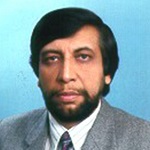
Dr. Shaftab Ahmed |
|
|
|
|
Speaker Biography:
Engr. Shaftab Ahmed, an adjunct faculty in ECE & OSE at the UNC Charlotte, USA, is a veteran Engineer, Researcher and Professor. He has served in a leading role at various institutions. Engr. Shaftab Ahmed is a former Associate Professor & Chair from Bahria University Islamabad, Pakistan and currently an adjunct faculty at the UNC Charlotte, USA. By his education and training, he is an Electrical Engineer with a focus on computer systems design / development and teaching experience of over almost four-decades. His current active research areas of interests and expertise include e-Healthcare, Telemedical Sensor Networks and Informatics for Healthcare Data Management Services in virtual hospital environment over cloud architecture, role of social networking in patient monitoring and the ubiquitous services with knowledge-based decision support solutions. In addition, he expanded his R&D work and teaching in the area of IoTs and frequently volunteers in co-organizing symposiums and workshops in IEEE HONET Conferences and also in SPIE iiScience series of International Conferences. | |
Symposium: Smart Sensing for e-Healthcare Applications using IoT, AI and ML TechnologiesTitle: Artificial Intelligence in Monitoring Patient Vital Signs and additional Real-Time in-situ Physiological and BioChemical “laboratory” results and derived Treatment recommendation |
|
|
Dr. Ir. Robert Splinter
Chief Operating Officer, Chief Technology Officer, Intelligent BioInformatics Ltd. UK, Manchester, UK Assistant Professor (adj.), University of North Carolina at Charlotte, Charlotte, NC, USA. |
|
| Abstract: Accurate diagnostics and patient care generally and mandatorily rely on the combined physiological and biochemical information obtained from various sources and under the use of many different (complementing) mechanisms-of-action. The acquisition of as much relevant information as possible, and subsequent automated processing will allow for an accurate and relevant diagnosis, followed by the definition of a reliable treatment protocol. The access to the patient’s own medical history files will be crucial in the diagnosis. Furthermore, the comparison against known pathological patterns of other patients will provide screening options to assess the patient health conditions early and determine the most appropriate treatment modalities or determine the need for additional follow-up test in other physiological, anatomical, or biochemical matters or body specific locations. This is just as important as placing the respective patient in the appropriate segment of the statistical distribution with respect to the perceived pathological framework. Another important assessment functionality is the risk stratification belonging to the patient conditions and the required urgency of the palliative and curative care. |

Dr. Ir. Robert Splinter |
| One specific example of the limitations of single source screening is the use of x-ray imaging only to assess coronary occlusions, and the determination of risk-factors of developing life-threatening cardiovascular conditions, and at which rate of development. One aspect of considerable importance associated with coronary health is the development of conditions leading up to heart-failure and imminent death. One important factor, frequently overlooked in diagnostic evaluation, is the medication portfolio associated with the patient’s health profile. Drugs, both recreative and prescribed, can affect the automated (AI-based) first impression created by chosen diagnostic modality. Having access to the full patient history will allow for a well-informed decision process. Comparing the diagnostic data to a database of patient presumably residing in a similar medical category will allow for a quick ranking of risks and assigning an appropriate treatment modus operandi. More importantly, pointing out the level of confidence with which the diagnostic can be made and recommending additional investigative actions. Supporting multi-model diagnostics includes various mechanisms-of-action. For instance, a large portion of the chemical conditions of a patient can nowadays be assessed with spectral imaging, even using a mobile phone. Conclusion: Since laboratory access may be limited to due to geographical location, or the restrictions to local investment in healthcare, cheap and interlaced diagnostic modalities with over-the-internet evaluation capabilities can bring advanced, accurate and appropriate healthcare to remote and undervalued parts of the world. More importantly, interconnected diagnostics will raise the value of appraising treatment options in a busy, lime-limited modern metropolitan healthcare facility as well. | |
|
Speaker Biography:
Dr. Splinter obtained his Ph. D., Physics and Medical Engineering, VU University of Amsterdam, Amsterdam and his Professional Engineer degree from The University of Technology Eindhoven, Eindhoven, The Netherlands. Robert has 20 plus years of electrophysiology \ cardiac rhythm management and medical device development and clinical validation including FDA and CE submissions, clearance and approvals. Dr. Splinter is a Technology Manager, Engineering Leader, with 25+ years of science and medical device technology experience using engineering and physics technologies for clinical sensing, diagnostics and treatment. Robert Splinter is also an independent research operator as the CTO of Splinter Consultants working on biometric diagnostics and signal processing as well as centralized data-acquisition with guided health technology support. | |
Symposium: Emerging Technologies and Challenges for Effective Teaching and Learning -Skills & Themes in Higher EducationTitle: Emerging Technologies and Challenges for Effective Teaching and Learning |
|
|
Dr. Ahmed S. Khan
Fulbright Specialist Scholar, World Learning Inc., U.S. Dept. of State’s Bureau of Educational & Cultural Affairs (ECA) |
|
|
Abstract:
Especially focused for the Institutional Leaders, VCs, Provosts, Educators and Administrator’s; Covering modern teaching techniques and theories. A Presentation on the Pedagogy by Dr. Ahmed S. Khan, Fulbright Specialist Scholar, Chicago, IL, USA. |

Dr. Ahmed S. Khan |
|
|
|
|
Speaker Biography:
Dr. Ahmed S. Khan is a Fulbright Specialist Scholar (2017-2022). Dr. Khan has more than forty years of progressively responsible experience in instruction (online and onsite), applied research, curriculum development, program and institutional accreditation, management, and supervision of undergraduate and graduate academic programs at DeVry University, one of the largest private universities in the United States. Dr. Khan held many academic positions that include Senior Processor, Chair, and Dean of the College of Engineering & Information, DeVry University, Addison, Illinois, USA. Dr. Khan also served as the National Curriculum Manager at the national headquarters of DeVry University, where he supervised and managed curriculum development and implementation of BSEEt & MSEE programs at 25 DeVry campuses located in the United States and Canada. Dr. Khan received his M.Sc (Applied Physics) from University of Karachi, an MSEE from Michigan Technological University, an MBA from Keller Graduate School of Management, and his Ph.D. from Colorado State University. His research interests are in the areas of Nanotechnology, Fiber Optics Communications, New Teaching & Learning Techniques, and Social and Ethical Implications of Technology. He is the author of many technical papers and presentations. He has authored/co-authored many books, including The Telecommunications Fact Book and Illustrated Dictionary, Fiber Optic Communication: An Applied Approach, Mashriq-o-Mugrib Ki Mumtaz Shaksiaat (Prominent Personalities of The East and West, Feroz Sons); the Science, Technology & Society (STS) series of books that include Technology and Society: Issues for the 21st Century & Beyond (3E), and Nanotechnology: Ethical and Social Implications, to stimulate, inspire, and provoke awareness of technology’s impact on society. He is senior member of the Institute of Electrical and Electronics Engineering (IEEE), and a member of American Society of Engineering Education (ASEE). Dr. Khan also serves as program Evaluator for the Accreditation agency ABET. | |
Symposium: Emerging Technologies and Challenges for Effective Teaching and Learning -Skills & Themes in Higher EducationTitle: The role of Technology in Education |
|
|
Dr. Iqbal Chaudhry
Science & Technology Education Project (STEP), Greensboro, North Carolina, USA |
|
|
Abstract:
A Learning Management System (LMS) is a software and hardware system that facilitates and enhances learning. It serves as a comprehensive educational platform where educators can upload course materials, and students can conveniently access them. The core functionalities of an LMS are course management, communication, assessments, progress tracking, and resource sharing. In course management, teachers can organize their courses by creating lessons, uploading study materials, and setting due dates for lessons and assignments. Teachers can create quizzes and tests, which students can take online or offline, with automatic grading by the LMS. In progress tracking, LMS keeps track of student activities, allowing teachers to identify those who need extra help. |

Dr. Iqbal Chaudhry |
|
|
|
|
Speaker Biography:
Iqbal Chaudhry is an electrical engineer with over 20 years of Semiconductor Industry experience. He did his PhD in Electrical Engineering from the University of Notre Dame. He taught in universities in Pakistan and the USA for 12 years before moving to Microelectronics industry. In the microelectronics industry, he worked on Silicon, SiGe, GaAs, and GaN integrated circuit technologies. Currently, he is working as a volunteer in a nonprofit organization called “Science & Technology Education Project (STEP)” that promotes Education Technology in underprivileged communities in Pakistan. | |
Symposium: Role of Emerging Technologies and Skills in Higher EducationTitle: Artificial Intelligence (AI) Based Fin-Tech Applications using Blockchain Security |
|
|
Dr. Muhammad Manshad Satti
CEO IT Butler, Smart Solutions & EduServ |
|
|
Abstract:
Over the last two decades, there have been several digital technologies, which have been transforming businesses and society at large. Blockchain is one of the most promising developments in the information technology domain and offers numerous benefits for not just industry but also government in providing better governance and public service. In brief, Blockchain is a technology which enables a ledger that can be accessed by all parties involved in the transaction and can act as the universal refutable depository of all transactions between involved parties It is essentially a global public ledger capable of automatically recording and verifying a high volume of digital transactions, regardless of location. |
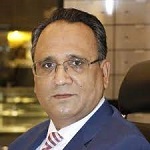
Dr. Manshad Satti |
| Alhough the word Blockchain became synonymous with cryptocurrencies over the last few years, the benefits involved in Blockchain have already attracted immense traction, and subsequently investments, from the financial sector as well as many other technological giants over the world. The technology holds the ability to change the way the financial sector works and would result in favorably impacting many other industries including technology, healthcare, supply chain, public-sector applications, consumer goods, media, telecom, law enforcement, ride hailing, and many other areas. | |
|
Speaker Biography:
Dr. Muhammad Manshad Satti has received a B.E (Elec.) and M Eng. (Telecom) from the University of New South Wales (UNSW) Sydney, and a Ph.D. (Comp Engr) from Deakin University Melbourne Australia. He has over twenty-five years of industrial experience in Electronics, IT, and Telecoms. Dr. Satti was appointed as Convener for Internet Voting Task Force (IVTF) in April 2018 by the order of the Supreme Court of Pakistan for scrutinizing the efficacy and cyber resilience testing of the I-Voting application developed by NADRA. He was chief information security officer (CISO) of Australia’s largest corporate telecom where he developed telecom security policies, risk assessment, security strategies, Innovation and leadership, and complex design for dedicated hosting, co-location, e-commerce, and online businesses. During this tenure, he has contributed to several forums and worked on Information Security Management System (ISMS). He has been engaged in research and development at a leading R & D Security research Laboratory, studying Deep Packet Inspection (DPI), Lawful Interception (LI), monitoring and Analysis, (LIMA) Intrusion Detection Systems (IDS), and Data mining techniques for 3-tier security architecture. Dr. Satti authored more than thirty-five publications on ICT Security, Risk Analysis, and GRC and conducted over forty international lectures and seminars. He is a member of IEEE (USA), the Institute of Engineers Australia (MIE Aust.), and earned Chartered Engineer (CEng.) recognition. Dr. Satti is enlisted at National Professional Register (NPR) Australia in IT, Telecom, and Electrical Engineering chapters. His research interests are on Data mining, DPI, LIMA, Mobile Location Tracking, LBS Data Analytics, Telecoms signaling security, and advance Detection systems used for mitigating future DOS / DDOS attacks at Internet and Corporate networks, where ISPs and Mobile Network Operators (MNO) are most victims of such attacks. | |




 conference program
conference program


